Susan notes: I've copied and pasted this biographical information and talk unabashedly from the TED website.
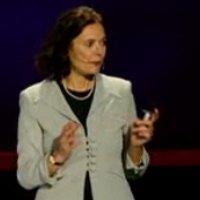 Louise Fresco shows us why we should celebrate mass-produced,
supermarket-style white bread. She says environmentally sound mass
production will feed the world, yet leave a role for small bakeries and
traditional methods.
Louise Fresco shows us why we should celebrate mass-produced,
supermarket-style white bread. She says environmentally sound mass
production will feed the world, yet leave a role for small bakeries and
traditional methods.
As food, climate and water crises loom, Louise Fresco is looking hard
at how we cultivate our crops and tend our livestock on a global scale.
An expert on agriculture and sustainability, Fresco shows how
2009-09-29
Posted in TED Talks (Individual)
Susan notes: I've copied and pasted this biographical information and talk unabashedly from the TED website.
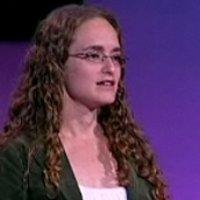 Sensing the motives and feelings of others is a natural talent for
humans. But how do we do it? Here, Rebecca Saxe shares fascinating lab
work that uncovers how the brain thinks about other peoples' thoughts
-- and judges their actions.
Sensing the motives and feelings of others is a natural talent for
humans. But how do we do it? Here, Rebecca Saxe shares fascinating lab
work that uncovers how the brain thinks about other peoples' thoughts
-- and judges their actions.
While still a graduate student, Rebecca Saxe made a breakthrough
discovery: There's a specific region in our brain that becomes active
when we contemplate the workings of other minds. Now, at MIT's Saxelab,
she and her team have been further exploring her grad-school finding,
exploring how it may help us understand conditions such as autism.
2009-09-28
Posted in TED Talks (Individual)
Susan notes: I've copied and pasted this biographical information and talk unabashedly from the TED website.
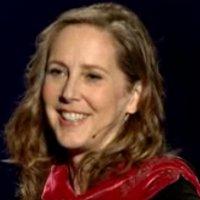 "Bonk" author Mary Roach delves into obscure scientific research, some
of it centuries old, to make 10 surprising claims about sexual climax,
ranging from the bizarre to the hilarious. (This talk is aimed at
adults. Viewer discretion advised.)
"Bonk" author Mary Roach delves into obscure scientific research, some
of it centuries old, to make 10 surprising claims about sexual climax,
ranging from the bizarre to the hilarious. (This talk is aimed at
adults. Viewer discretion advised.)
Freelance writer and humorist turned accidental science journalist Mary Roach likes to ask the questions we all wonder about
but are usually too polite to mention. What happens after we die,
anyway? How fast do cadavers rot? Can a corpse have an orgasm?
2009-09-28
Posted in TED Talks (Individual)
Susan notes: I've copied and pasted this biographical information and talk unabashedly from the TED website.
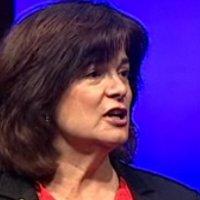 Carolyn Porco shares exciting new findings from the Cassini
spacecraft's recent sweep of one of Saturn's moons, Enceladus. Samples
gathered from the moon's icy geysers hint that an ocean under its
surface could harbor life.
Carolyn Porco shares exciting new findings from the Cassini
spacecraft's recent sweep of one of Saturn's moons, Enceladus. Samples
gathered from the moon's icy geysers hint that an ocean under its
surface could harbor life.
Planetary scientist Carolyn Porco studies and interprets the photos from the Cassini-Huygens
mission, orbiting Saturn and its largest moon, Titan. She and a team of
scientists from NASA and the European Space Agency have been analyzing
the images that Cassini
has been sending back since it left Earth in 1999. They've found many
new rings and four new moons (so far). And they've produced breathtaking images and animations of the stormy face of Saturn, its busy rings, and its jumble of moons and moonlets.
2009-09-28
Posted in TED Talks (Individual)
Susan notes: I've copied and pasted this biographical information and talk unabashedly from the TED website.
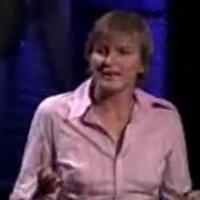 Louise Leakey asks, "Who are we?" The question takes her to the Rift
Valley in Eastern Africa, where she digs for the evolutionary origins
of humankind -- and suggests a stunning new vision of our competing
ancestors.
Louise Leakey asks, "Who are we?" The question takes her to the Rift
Valley in Eastern Africa, where she digs for the evolutionary origins
of humankind -- and suggests a stunning new vision of our competing
ancestors.
Louise Leakey is the third generation of her family to dig for humanity’s past in East Africa. In 2001, >Leakey and her mother, Meave, found a previously unknown hominid, the 3.5-million-year-old Kenyanthropus platyops,
at Lake Turkana -- the same region where her father, Richard,
discovered the "Turkana Boy" fossil, and near Tanzania’s Olduvai Gorge,
where her grandparents, Louise and Mary Leakey, discovered the bones of
>Homo habilis.
2009-09-28
Posted in TED Talks (Individual)
 Louise Fresco shows us why we should celebrate mass-produced,
supermarket-style white bread. She says environmentally sound mass
production will feed the world, yet leave a role for small bakeries and
traditional methods.
Louise Fresco shows us why we should celebrate mass-produced,
supermarket-style white bread. She says environmentally sound mass
production will feed the world, yet leave a role for small bakeries and
traditional methods.
 Sensing the motives and feelings of others is a natural talent for
humans. But how do we do it? Here, Rebecca Saxe shares fascinating lab
work that uncovers how the brain thinks about other peoples' thoughts
-- and judges their actions.
Sensing the motives and feelings of others is a natural talent for
humans. But how do we do it? Here, Rebecca Saxe shares fascinating lab
work that uncovers how the brain thinks about other peoples' thoughts
-- and judges their actions.
 "Bonk" author Mary Roach delves into obscure scientific research, some
of it centuries old, to make 10 surprising claims about sexual climax,
ranging from the bizarre to the hilarious. (This talk is aimed at
adults. Viewer discretion advised.)
"Bonk" author Mary Roach delves into obscure scientific research, some
of it centuries old, to make 10 surprising claims about sexual climax,
ranging from the bizarre to the hilarious. (This talk is aimed at
adults. Viewer discretion advised.)
 Carolyn Porco shares exciting new findings from the Cassini
spacecraft's recent sweep of one of Saturn's moons, Enceladus. Samples
gathered from the moon's icy geysers hint that an ocean under its
surface could harbor life.
Carolyn Porco shares exciting new findings from the Cassini
spacecraft's recent sweep of one of Saturn's moons, Enceladus. Samples
gathered from the moon's icy geysers hint that an ocean under its
surface could harbor life.
 Louise Leakey asks, "Who are we?" The question takes her to the Rift
Valley in Eastern Africa, where she digs for the evolutionary origins
of humankind -- and suggests a stunning new vision of our competing
ancestors.
Louise Leakey asks, "Who are we?" The question takes her to the Rift
Valley in Eastern Africa, where she digs for the evolutionary origins
of humankind -- and suggests a stunning new vision of our competing
ancestors.